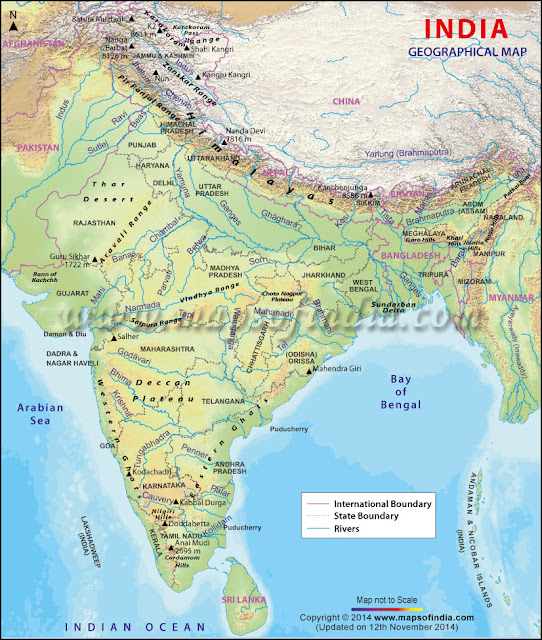Major Causes of Communalism in India
- Get link
- X
- Other Apps
ssc preparation, important competetion questions, current affairs of india, latest question asked in competetion papers,
9 Major Causes of Communalism in India
(1) A Legacy of Past:On the basis of the “Two Nation” theory of Jinnah, India was partitioned. Communal politics had played its nasty game during the immediate past of independent India. The “Divide and Rule” policy of the British Government served their colonial interest. The partition of India was the ultimate outcome of their politics. Despite the emergence of Pakistan, a large number of Muslims are staying in India. India has adopted the principles of secularism and equality of the people. But communalism as a legacy of past, is continuing and expressing itself in various form.
(2) Presence of Communal Parties:
Religion in India has become an important agency of political socialization and it is also reflected in the ideology of a number of political parties. A number of communal and sectarian political parties and organisations are present in India. Muslim League, Jamaat—Islami, Hindu Mahasabha, Akali Dal, Vishwa Hindu Parishad are directly or indirectly responsible for the emergence of communalism.
The so called secular political parties also enter into alliance with communal forces for electoral benefit. Candidates are selected by different political parties taking into account the communal composition of the constituency.
Some political leaders preach communalism to attain their immediate political goal. They have become leaders and continue to remain as such only due to the adoption of communal and sectarian interest. When political leaders and their organisations are not away from communalism, obviously this spirit will be promoted in the society.
(3) Isolation of Muslims:
Indian Muslims have developed a tendency of isolationism even long after the creation of Pakistan. They remain aloof from the mainstream of national politics. Most of them are not interested to take part in the secular-nationalistic politics of the country. They insist on to be treated as a separate entity.
With their separate culture and different customs, they have a distinct identity. Some orthodox and biotic organisations not only uphold Islamic fundamentalism, they also demand reservation facilities for Muslims. Their isolation creates a psychological separation and misunderstanding which promote communal tensions in the society.
(4) Poverty:
Mass poverty and unemployment create a sense of frustration among the people. It generates backwardness, illiteracy, ignorance, etc. The unemployed youth of both the communities can be easily trapped by religious fundamentalists and fanatics. They are used by them to cause communal riots. Moreover, in comparison with the Muslims, Hindus are better placed in service, industry and trade which cause a sense of contempt among them. The weak economic status often breeds communalism.
(5) Hindu Chauvinism:
The growths of Hindu chauvinistic attitudes have further strengthened the communal tensions in India. The Hindu religious groups like Shiv Sena, Hindu Mahasabha, Viswa Hindu Parisad often pressurize the government to take steps suitable to the interest of Hindus. They consider each Muslim as pro-Pakistani and anti-national. To face the possible challenge of other communal forces, they encourage the growth of Hindu communalism.
They oppose the minority protection policies of the government and treat it as appeasement policy. The controversy over the Ayodhya issue and the demolition of “Babri Masjid” was nothing but a manifestation of Hindu Chauvinism.
(6) The Social Cause:
The two major communities of India have been suspicious towards each other. The Muslims complain of the threat of Hindu cultural invasion upon their lives and have become more assertive of their rights. Either due to ignorance or insecurity, they do not fully accept the need of family planning and help in increasing population.
The recent controversy over the Census Report shows how the Hindu Chauvinists react towards the growing population of Muslims. Moreover, another social cause of communalism is conversion. Every Indian has the right to follow whatever religion he/she likes. But when conversion from one religion to another is made by offering some facilities like money, education, service etc. it creates negative reactions.
(7) Communalization of Politics:
Electoral politics in India has become more expensive and competitive. Different political parties are not hesitating to use any means, fair or foul, for electoral victory. They even create communal tensions and try to take political advantage out of it. Concessions are granted to various minority groups for appeasing them.
Each and every party is playing communal card and if situation so demands, is not hesitating to join hands with the communal parties for coming to power. Communalization of politics as a process is supporting the growth of communalism in India.
(8) Cross-Border Factors:
Communal tensions in India sometimes are highly intensified due to the rule of two neighbouring theocratic countries. These countries try to create communal problems in the border states. The communal problems of Punjab and Jammu Kashmir are caused due to provocation of Pakistan. So long as this cross-border factor is not removed, communal problems are likely to stay in India.
(9) Failure of Government:
Both the Union and the State Governments often fail to prevent communalism in the country. Due to lack of prior information, they fail to take any preventive measures. So the communal violence can easily take innocent lives and destroys property. The post-Godhra riot in Gujarat shows the inefficiency of the government to control the communal riot. Failure of immediate and effective steps has been a cause of the continuance of communalism.
- Get link
- X
- Other Apps

Comments
Post a Comment